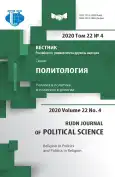Simulative Reality as a Challenge for National Identity: Theory and Russian Political Practices
- Авторлар: Titov V.V.1
-
Мекемелер:
- Financial University under the Government of the Russian Federation
- Шығарылым: Том 22, № 4 (2020): RELIGION IN POLITICS AND POLITICS IN RELIGION
- Беттер: 590-602
- Бөлім: RELIGION, NATION, IDENTITY: POLITICAL MEANINGS IN THE MODERN WORLD
- URL: https://journal-vniispk.ru/2313-1438/article/view/322184
- DOI: https://doi.org/10.22363/2313-1438-2020-22-4-590-602
- ID: 322184
Дәйексөз келтіру
Толық мәтін
Аннотация
The purpose of the study is a political and theoretical analysis of the phenomenon of simulated reality, its impact on the transformation of national-state identity, understood as a macro-political construct - an integrated image of “us”, “ours”, the dynamics of which are determined both by the logic of development of a specific national political system and by the wide a range of historical and cultural-psychological factors. The author defines a simulated political reality as a multidimensional space of political simulacra in their interaction and transformation. The mobility of the information landscape of modern Russian society leads to the construction of amorphous and unstable identities that do not have a deep value-semantic foundation and are based on emotional and symbolic content. The indicated identities, which are built around a social fashion - virtual communities of interest - successfully compete with the attitudes of Russian national identity and reduce its significance. In particular, this trend characterizes the self-identification of young Russians - representatives of generations of “millennials” and “digital natives”. The specifics of the development of the Runet’s digital space is not the main reason, but in many respects contributes to the devaluation of the image of the past, and also acts as one of the information-psychological drivers of the crisis of the image of the future.
Авторлар туралы
Victor Titov
Financial University under the Government of the Russian Federation
Хат алмасуға жауапты Автор.
Email: vvtitov@fa.ru
PhD in Politics, Senior Research Fellow of the Department of Political Science
(GSP-3), 49, Leningradsky Prospekt, Moscow, 125993, Russian FederationӘдебиет тізімі
- Evgenieva T.V., Titov V.V. The Image of the “Enemy” as a Forming Instrument for Political Identity in the Internet: The Experience of Contemporary Russia. Information Wars. 2014; 4: 22–27 (In Russ.).
- Chistyakov D.I. Information society and media in the Postmodern Communicative Space. RUDN Journal of Philosophy. 2013; 2: 173–179 (In Russ.).
- Kaftan V.V. Forms and Phenomena of Mass Communication. Journal of Philosophical Studies. 2018; 1: 26–42 (In Russ.).
- Nosov N.A. Psychological virtual reality. Moscow: RAS Institution of man; 1994 (In Russ.).
- Baudrillard J. Simulation and simulation. Moscow: Postum; 2016 (In Russ.).
- Belov S.I. Russian memorial policy in the mirror of the blogosphere (on the materials of the video bloggers). Bulletin of the Russian Nation. 2018; 3 (61): 169–178 (In Russ.).
- Anderson B. Imagined Communities: Reflections on the Origins and Spread of Nationalism. London: Verso; 1991. 224 р.
- Huntington S. Who are we?: The Challenges of American National Identity. Moscow: Transitkniga; 2004 (In Russ.).
- Semenenko I. Nations, Nationalism, National Identity: New Dimensions in Academic Discourse. Mirovaya ekonomika i mezhdunarodnye otnosheniya. 2015; 59 (11): 91–102 (In Russ.).
- Malinova O. Yu. Designing Macropolitical Identity in Post-Soviet Russia. Political Expertise: POLITEX. 2010; 1: 5–28 (In Russ.).
- Fadeyeva L.A. The problem of identity in modern comparative political science. Polis. Political Studies. 2011; 1: 134-139 (In Russ.).
- Volkov Yu.G. Images of the Future in the Formation of Russian Identity. Social and Humanitarian Knowledge. 2019; 1: 81–98 (In Russ.).
- Morozova E.V. Compound Identity as an Object for Political Analysis. Chelovek. Soobshchestvo. Upravlenie. 2012; 1: 60–66 (In Russ.).
- Bushuev V.V., Titov V.V. National-state identity in the modern world and the role of historical politics in its formation (theoretical and methodological analysis). Bulletin of the Moscow State Humanitarian University. M.A. Sholokhov. History and Political Science. 2011; 4: 80–82 (In Russ.).
- Timofeev I.N. Russian political identity through the prism of history interpretation. MGIMO Bulletin. 2010; 3: 51–59 (In Russ.).
- Shestopal E.B., Smul’kina N.V. How do Russians perceive their country today? Journal of Political Theory, Political Philosophy and Sociology of Politics Politeia. 2018; 2 (89): 51–68 (In Russ.).
- Frumkin K.G. Alternative historical fiction as a form of historical memory. Historical Expertise. 2016; 4: 17–28 (In Russ.).
- Berger P.L., Luckmann T. The Social Construction of Reality. A Treatise on sociology of Knowledge. Moscow: Medium; 1995. 323 р. (In Russ.).
- Castells M. The power of identity. Cambridge: Mass.; 1997. 566 р.
Қосымша файлдар









